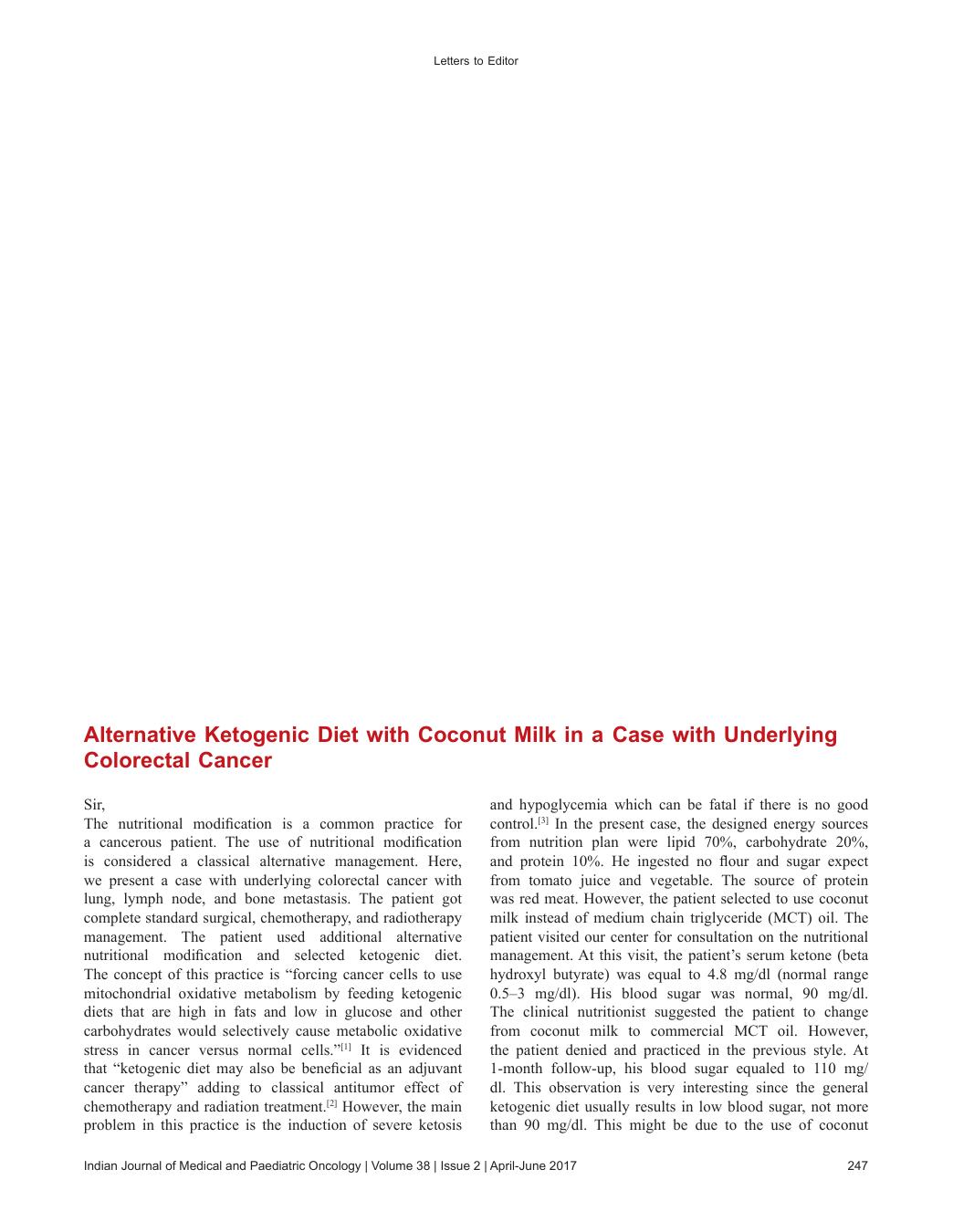Alternative Ketogenic Diet with Coconut Milk in a Case with Underlying Colorectal Cancer
CC BY-NC-ND 4.0 · Indian J Med Paediatr Oncol 2017; 38(02): 247-248
DOI: DOI: 10.4103/ijmpo.ijmpo_47_16

|
Publication History
Article published online:
06 July 2021
© 2017. Indian Society of Medical and Paediatric Oncology. This is an open access article published by Thieme under the terms of the Creative Commons Attribution-NonDerivative-NonCommercial-License, permitting copying and reproduction so long as the original work is given appropriate credit. Contents may not be used for commercial purposes, or adapted, remixed, transformed or built upon. (https://creativecommons.org/licenses/by-nc-nd/4.0/.)
Thieme Medical and Scientific Publishers Pvt. Ltd.
A-12, 2nd Floor, Sector 2, Noida-201301 UP, India
Sir,
The nutritional modification is a common practice for a cancerous patient. The use of nutritional modification is considered a classical alternative management. Here, we present a case with underlying colorectal cancer with lung, lymph node, and bone metastasis. The patient got complete standard surgical, chemotherapy, and radiotherapy management. The patient used additional alternative nutritional modification and selected ketogenic diet. The concept of this practice is “forcing cancer cells to use mitochondrial oxidative metabolism by feeding ketogenic diets that are high in fats and low in glucose and other carbohydrates would selectively cause metabolic oxidative stress in cancer versus normal cells.”[1] It is evidenced that “ketogenic diet may also be beneficial as an adjuvant cancer therapy” adding to classical antitumor effect of chemotherapy and radiation treatment.[2] However, the main problem in this practice is the induction of severe ketosis and hypoglycemia which can be fatal if there is no good control.[3] In the present case, the designed energy sources from nutrition plan were lipid 70%, carbohydrate 20%, and protein 10%. He ingested no flour and sugar expect from tomato juice and vegetable. The source of protein was red meat. However, the patient selected to use coconut milk instead of medium chain triglyceride (MCT) oil. The patient visited our center for consultation on the nutritional management. At this visit, the patient's serum ketone (beta hydroxyl butyrate) was equal to 4.8 mg/dl (normal range 0.5–3 mg/dl). His blood sugar was normal, 90 mg/dl. The clinical nutritionist suggested the patient to change from coconut milk to commercial MCT oil. However, the patient denied and practiced in the previous style. At 1-month follow-up, his blood sugar equaled to 110 mg/dl. This observation is very interesting since the general ketogenic diet usually results in low blood sugar, not more than 90 mg/dl. This might be due to the use of coconut oil instead of standard MCT. In the next month, his ketone level was equal to 4.8 mg/dl and the patient developed calf muscle pain and cramp in his legs. Additional magnesium at dosage 350 mg/day was prescribed for correcting this problem and the patient returned to normal. With these nutritional modifications, the patient successfully has a ketogenic diet with above average blood sugar.
Financial support and sponsorshipNil.
Conflicts of interest
There are no conflicts of interest.
References
- Allen BG, Bhatia SK, Anderson CM, Eichenberger-Gilmore JM, Sibenaller ZA, Mapuskar KA, et al. Ketogenic diets as an adjuvant cancer therapy: History and potential mechanism. Redox Biol 2014;2:963-70.
- Vidali S, Aminzadeh S, Lambert B, Rutherford T, Sperl W, Kofler B, et al. Mitochondria: The ketogenic diet – A metabolism-based therapy. Int J Biochem Cell Biol 2015;63:55-9.
- Kapelner A, Vorsanger M. Starvation of cancer via induced ketogenesis and severe hypoglycemia. Med Hypotheses 2015;84:162-8.
References
- Allen BG, Bhatia SK, Anderson CM, Eichenberger-Gilmore JM, Sibenaller ZA, Mapuskar KA, et al. Ketogenic diets as an adjuvant cancer therapy: History and potential mechanism. Redox Biol 2014;2:963-70.
- Vidali S, Aminzadeh S, Lambert B, Rutherford T, Sperl W, Kofler B, et al. Mitochondria: The ketogenic diet – A metabolism-based therapy. Int J Biochem Cell Biol 2015;63:55-9.
- Kapelner A, Vorsanger M. Starvation of cancer via induced ketogenesis and severe hypoglycemia. Med Hypotheses 2015;84:162-8.


 PDF
PDF  Views
Views  Share
Share

